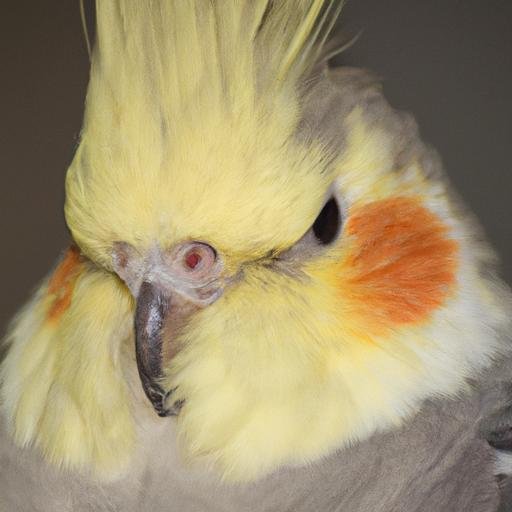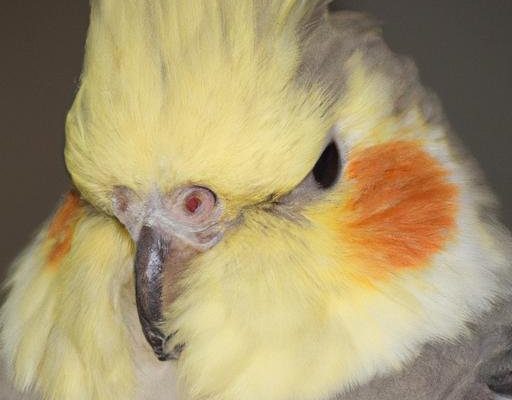
So, how do you know if your cockatiel is feeling under the weather? Keep reading, and let’s explore the warning signs and when it’s time to call in the experts. Think of it as a little guide to becoming the best bird parent you can be.
Common Signs of Illness in Cockatiels
When it comes to spotting potential health issues in your cockatiel, observation is key. These birds can’t say, “Hey, I’m not feeling well,” but they do exhibit certain behaviors that can indicate something is off. Here are a few signs you might notice:
- Change in Appetite: If your bird suddenly refuses to eat or drink, that could be a red flag. Cockatiels usually have a good appetite, so any sudden change might signal a health issue.
- Fluffed Feathers: Ever seen your cockatiel sitting all puffed up? This could mean they’re feeling cold or unwell. Healthy birds usually keep their feathers sleek and close to their bodies.
- Changes in Vocalization: If your chatty cockatiel suddenly goes quiet, it could indicate distress or discomfort. On the other hand, excessive screaming might also be a sign of something wrong.
Notice how each of these signs highlights changes from their normal behavior. It’s a bit like when a friend starts acting differently—you can’t help but wonder if something’s bothering them.
Physical Symptoms to Look For
Physical symptoms are often the first indicators of illness in cockatiels. Here are some specifics to keep an eye on:
- Nasal Discharge: If you see any discharge coming from your cockatiel’s nostrils, that could indicate a respiratory issue. Normal birds should have clean, clear nostrils.
- Swelling or Bumps: Any unusual swelling or lumps on your cockatiel’s body should be assessed. These could suggest infections or even tumors, which require immediate attention.
- Abnormal Droppings: Cockatiel droppings can be an insightful health indicator. Changes in color or consistency can signal digestive issues. A healthy diet should lead to healthy droppings.
Think of your cockatiel’s droppings as their little report card. If something doesn’t look right, you might want to pay closer attention.
Behavioral Changes to Notice
Birds are creatures of habit, so any sudden shifts in their behavior can hint at health problems. Here are some behavioral changes you shouldn’t ignore:
- Excessive Sleeping: If your cockatiel is sleeping more than usual, they might be feeling under the weather. Birds typically sleep a lot, but if they’re spending all day snoozing, it’s time for a check-up.
- Avoiding Interaction: Cockatiels are social creatures. If yours suddenly becomes withdrawn or stops interacting with you or their environment, that could be a sign that they’re unwell.
- Unusual Aggression: While some birds can have a feisty personality, sudden aggression or biting can indicate pain or distress. It’s a clear signal that something’s wrong.
Just like with humans, changes in mood and behavior can often reveal deeper issues. So if your cockatiel starts acting differently, don’t brush it off.
When to See a Vet
Now that you know the signs, the next question is: when should you see a vet? Honestly, it’s better to be safe than sorry. Here are some key moments when a trip to the vet is essential:
- Multiple Symptoms: If you notice more than one concerning sign, it’s usually a good idea to make an appointment. Think of it as your bird sending you a clear distress signal.
- Persistent Issues: If symptoms persist for more than a day or two, don’t wait. Birds can deteriorate quickly, and early intervention is often crucial.
- Severe Symptoms: Signs like difficulty breathing, severe lethargy, or bleeding should prompt immediate vet attention. These issues can be life-threatening and need urgent care.
Imagine your cockatiel is trying to tell you it needs help, and your job is to listen. Being proactive can save your feathered friend a lot of discomfort.
Finding a Suitable Avian Vet
Choosing the right vet is just as important as knowing when to go. Here are some tips for finding a great avian veterinarian:
- Look for Specialization: Not all vets are trained to work with birds. Look for a veterinarian who specializes in avian care. They’ll have the expertise to identify and treat cockatiel illnesses effectively.
- Ask for Recommendations: Check in with local bird clubs or online communities for vet recommendations. Other bird owners can often share their experiences and help you find a reliable vet.
- Hospital Facilities: Ensure the clinic is well-equipped for avian care. A good vet should have proper facilities for diagnosing and treating birds.
It’s a bit like finding a mechanic for your car—only you want someone who really knows how to handle the specific needs of your little friend.
Regular Health Checkups
Prevention is always better than cure. Regular vet checkups can help catch issues before they become serious. Here’s why routine care is crucial:
- Early Detection: Just like with humans, routine exams allow vets to spot potential health problems early. Catching an issue in its infancy can lead to a better outcome.
- Vaccinations & Preventative Care: Regular visits also ensure your cockatiel receives necessary vaccinations and preventative treatments to keep them healthy.
- Diet and Nutrition Advice: Vets can help you understand your cockatiel’s dietary needs, keeping their weight and nutritional status in check for a longer, healthier life.
Think of it as part of good parenting. Just like you wouldn’t skip your kid’s checkups, your feathered friend deserves the same TLC.
Being a cockatiel parent comes with its own set of joys and responsibilities. Understanding the signs of illness in your feathered friend is crucial for their well-being. By keeping an eye out for changes in behavior, physical symptoms, and overall health, you can ensure your pet gets the care they need when they need it. And when in doubt, don’t hesitate to reach out to a vet. Remember, prevention and early intervention are your best friends in keeping your cockatiel happy and healthy. With a watchful eye and a little bit of knowledge, you can provide an environment where your cockatiel thrives.

